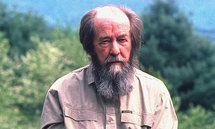
Solzhenitsyn
The shortened version of the 1970s book is the work of Solzhenitsyn's wife Natalia, who said 10,000 copies had been printed for Russian schools.
Banned in the former Soviet Union until perestroika -- the liberal reforms introduced in the 1980s -- the book is now part of Russia's school curriculum.
The launch of the shortened version, ahead of the date October 30 when Russians honour victims of political repression, was characterised by Putin as "a major event."
After "The Gulag Archipelago" was published in the West, Solzhenitsyn was stripped of his Soviet citizenship and expelled from the country.
He spent 20 years in exile in Europe and the United States before returning to Russia in 1994, after the fall of the Soviet Union.
Solzhenitsyn's writings remain controversial in Russia. A slice of the population venerates former Soviet dictator Joseph Stalin -- whose brutality was depicted in Solzhenitsyn's works -- for his role in defeating the Nazis during World War II.
----------------------------------------------------------------------------
Banned in the former Soviet Union until perestroika -- the liberal reforms introduced in the 1980s -- the book is now part of Russia's school curriculum.
The launch of the shortened version, ahead of the date October 30 when Russians honour victims of political repression, was characterised by Putin as "a major event."
After "The Gulag Archipelago" was published in the West, Solzhenitsyn was stripped of his Soviet citizenship and expelled from the country.
He spent 20 years in exile in Europe and the United States before returning to Russia in 1994, after the fall of the Soviet Union.
Solzhenitsyn's writings remain controversial in Russia. A slice of the population venerates former Soviet dictator Joseph Stalin -- whose brutality was depicted in Solzhenitsyn's works -- for his role in defeating the Nazis during World War II.
----------------------------------------------------------------------------









 Home
Home Politics
Politics









